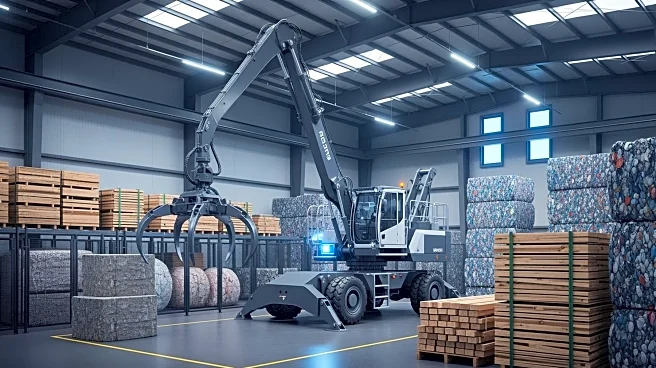What's Happening?
Develon has introduced the DX270WMH-7 wheeled material handler, designed to improve performance in material-sorting and handling applications such as timber movement, recycling, and demolition. The machine
is powered by Develon's latest DL06V six-cylinder, turbocharged, water-cooled diesel engine, which delivers 141kW (189hp) at 1,900 rev/min and complies with Stage V emissions standards. The handler features a newly engineered undercarriage, boom, arm, elevating cab, and counterweight, enhancing stability and operator visibility. The cab includes an ergonomic interior with smart controls and reinforced structures for safety.
Why It's Important?
The launch of the DX270WMH-7 material handler represents a significant advancement in the forestry and recycling industries, offering improved efficiency and safety in operations. The enhanced stability and visibility provided by the new design can lead to increased productivity and reduced operational risks. This development is crucial for businesses involved in timber movement and recycling, as it can streamline processes and potentially lower costs. The machine's compliance with Stage V emissions standards also aligns with environmental regulations, supporting sustainable practices in these industries.
What's Next?
As Develon rolls out the DX270WMH-7, industry stakeholders may evaluate its performance and adaptability in various applications. Companies involved in timber and recycling operations might consider integrating this new technology to enhance their capabilities. Additionally, the machine's compliance with emissions standards could influence other manufacturers to adopt similar environmentally friendly technologies. The reception of this material handler in the market will likely determine future innovations and developments in the sector.
Beyond the Headlines
The introduction of the DX270WMH-7 could have broader implications for the industry, potentially setting new standards for material handling equipment. The focus on safety and environmental compliance may drive further advancements in machine design, encouraging manufacturers to prioritize these aspects. This shift could lead to long-term benefits for both the industry and the environment, promoting sustainable practices and reducing the ecological footprint of material handling operations.










